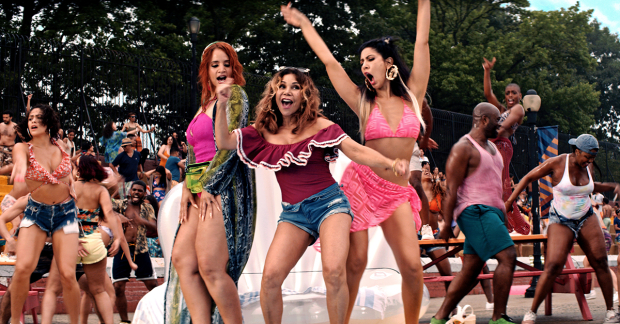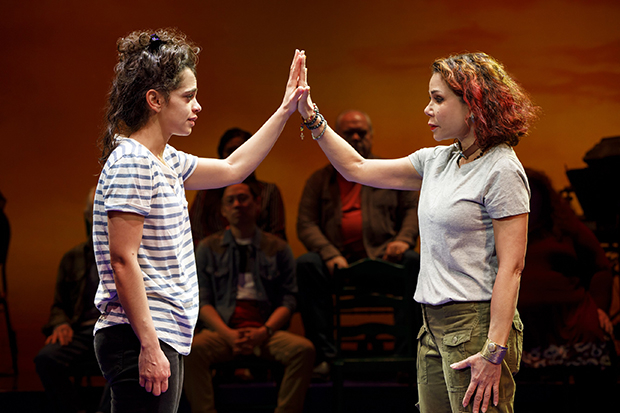Interview: Daphne Rubin-Vega on Portraying Daniela and the Everlasting Impact of In the Heights
The Broadway star is here to change the film industry forever.
It's a sweltering afternoon in Puerto Rico, and I need a place with electricity and silence to interview Daphne Rubin-Vega.
Changes in the transmission and distribution of electricity in Puerto Rico and a ravaged power grid have resulted in blackouts for over a week, making my technical difficulties quite fitting, since a blackout and rising summer temperatures signal turning points in Jon M. Chu's film adaptation of Lin-Manuel Miranda and Quiara Alegría Hudes's In the Heights. When I finally Zoom with Rubin-Vega with time to spare, she makes me feel right at home.
For Daphne Rubin-Vega, Daniela, the beauty salon owner she plays, isn't just a character; she's an extension of herself. She knows the ins and outs of the theater world and the importance of chosen families. But it's Daniela's desire to create a legacy, her integrity, and her resilience that she connects with the most. But Rubin-Vega's legacy reaches further than Daniela's ever could, reminding us that solidarity means nothing if it doesn't center those who have been left behind for so long. At the center, however, In the Heights is a story about the human experience with Rubin-Vega trying to uplift her community, after an unexpected loss, with her unwavering spirit.
Rubin-Vega opened up to TheaterMania about the importance of Latinx people telling Latinx stories, how being from Panama influences her creative development, and where Daniela ends and Daphne begins.

(© Warner Bros. Entertainment Inc.)
This interview has been edited and condensed for clarity.
What do you find most interesting about Daniela?
Every shred of me was excited about playing this role. I'd worked with Quiara in Miss You Like Hell, and because of my history with Quiara and Lin, I knew about In the Heights and saw it. Daniela is such a powerful character. She's diminutive, but you can feel her presence whenever she walks into a room. It was interesting to further explore her relationship with Carla, her life partner and business partner, and her dynamic with Cuca and the rendition of the salon in a filmic way. There were no restrictions with Quiara, Lin, and Jon.
Women often have an ambivalent relationship with ambition, so it's interesting to think about it within the context of the movie. Was that something you thought of when you were shaping your take on Daniela?
I don't know if ambitious people call themselves ambitious. I consider myself ambitious, but what's the ambition? The ambition is to live a full life. The ambition is to live a complete, free, unapologetic life where I can love who I want to love and live where I want to live, do what I love to do, wear what I want to wear, and have friends I want. If that's ambition, isn't that the American way, the pursuit of happiness? I think that Daniela, because of her appearance, her attitude is amplified, but if she looked different, she'd be a regular strong chick. Her choices wouldn't be questioned; she'd be pragmatic. She's priced out of the barrio that she loves. She'll be present in some ways, but her business will be gone.
You were born in Panama and there's a mythology attached to Latin America and Latin American culture. Do you think that has affected your creative development?
I mean, the mythology of Latino America is that it's kind of a monolith to me as to what it really is, which is incredibly layered and nuanced. Thanks to the centuries of slavery, we look the way we do and why we're full of contradictions. So being from Panama, I grew up with a mom who loved to be a truth-teller. I'd find her sometimes saying that she was from Colombia, and I'd ask her why. She said that when she was my age, people thought that people in Panama didn't have shoes or didn't know how to drive—the idea that you were subhuman somehow like savages, the idea that if a place is inhabited with people that look like you, then it's kind of not inhabited. So there's the realistic, pragmatic way my mother dealt with it, which was to not deal with it, and so that has changed.
When I think of In the Heights, the first words that come to mind are "paciencia y fe." Is there anything that you're like, "I really wish people would talk more about this aspect of the movie"?
I'm not trying to police what people think about the movie. Last year was the year of "paciencia y fe." It's been a year that we've been waiting to release the film. We shot it two summers ago, and it was a great, great summer, and then another summer occurred. It was devastating on so many levels, so whether we wanted to or not, we were required to implement "paciencia y fe," which made it better for me to know that I wasn't alone. It was such an isolating experience, and it was happening to the whole planet, and that's maybe the sign of something greater. We couldn't have planned for the movie to come out at such a critical time that it's also a time to emphasize the importance of Latinx people telling Latinx stories. It's going to be a medicine for all that "paciencia y fe."
I loved you in Miss You Like Hell! Beatriz, the character you played, sported bright pink hair in La Jolla and yellow and orange hair [Rubin-Vega called it "Tequila Sunrise"] at the Public. If Beatriz and Olivia walked into Daniela's salon, how would she style their hair?
Daniela would wash, condition, and give Olivia a basic but neatening trim to get rid of the bird's nest. She'd give her a blunt, mid-length bob, maybe some layers in the front, only if Olivia wants it. The other choice is to do whatever Olivia asks but definitely wash that hair [laughs]. As for Beatriz, I think Daniela would take the color out of Beatriz's hair and weave in some balayage, maybe start lowlighting and maybe wait and get the darn color out.

(© Joan Marcus)










